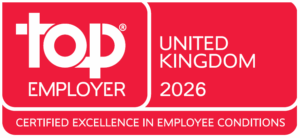People
J D Wetherspoon
People
Publishing date: October 2025
Top Employer United Kingdom
Wetherspoon has been recognised for 20 years, including 2025, by the Top Employers Institute, as a ‘Top Employer United Kingdom’.
During the pandemic, applications for accreditation were paused (2021 and 2022).
In addition, Wetherspoon was included as a Financial Times Europe’s Best Employers 2025.
Employee numbers
The average total employees across the financial year was 42,081, in pubs, hotels and at the head office (in Watford, Herfordshire).
In Ireland, over 580 people were employed.
The company does not employ anyone below either 16 years of age or the recognised school-leaving age.
Numerous people join the company from the NEET population – a name given for those aged 16–24 who are ‘not in education, employment or training’ and can start with limited basic skills and confidence.
Of the company’s staff, 53% are aged 24 years or under; therefore, for many, this is their first experience of working.
Many employees have chosen to spend their career with Wetherspoon and progressed through the company.
The attraction and retention of talented pub and kitchen managers are important for any hospitality business. As the table below demonstrates, the retention of managers has, over the years, steadily improved.
| Financial year | Pub managers’ average length of service (years/months) | Kitchen managers’ average length of service (years/months) |
|---|---|---|
| 2013 | 9.1 | 6 |
| 2014 | 10 | 6.1 |
| 2015 | 10.1 | 6.1 |
| 2016 | 11 | 7.1 |
| 2017 | 11 | 8 |
| 2018 | 12 | 8.1 |
| 2019 | 12.2 | 8.1 |
| 2020 | 12.9 | 9.1 |
| 2021 | 13.6 | 9.6 |
| 2022 | 13.9 | 10.4 |
| 2023 | 14.3 | 10.6 |
| 2024 | 14.9 | 10.9 |
| 2025 | 15.4 | 11.5 |
The average length of service for a pub manager is 15 years and four months and a kitchen manager 11 years and five months.
There are 31 employees who have worked for the company for more than 30 years, 715 for more than 20 years, 4,393 for more than 10 years and 11,041
for more than five years.
All staff are employed directly by the company, with the exception of a few head-office contractors, involved in specific project work.
Of hourly paid staff, 96.6% are employed on a guaranteed-hour contract. A minority of employees prefers the flexibility of a contract with no minimum hours. Where these contracts are used, employees receive exactly the same benefits as those on a guaranteed-hour contract, there is no sole-employer restriction and no obligation on employees to accept those hours offered.
Equality, diversity and inclusion
Wetherspoon strives to maintain a working environment, terms and conditions of employment and personnel and management practices which ensure that no individual receives less favourable treatment, or discrimination, on the grounds of:
- age.
- gender (including gender reassignment).
- marital or civil partnership.
- part-time status.
- physical or mental disabilities.
- pregnancy or maternity.
- race (including nationality, colour, ethnic origin)1.
- religion or belief.
- sex.
- sexual orientation.
Wetherspoon’s commitment to equality, diversity and inclusion
Wetherspoon actively promotes equality, diversity and inclusion, throughout the company, by the application of employment policies and practices which ensure that individuals receive treatment which is fair, equitable and consistent with their
relevant aptitudes, potential, skills and abilities.
All managers will seek to ensure that all employees comply with these principles, and Wetherspoon will provide training to those who have special responsibility for applying the ‘equality, diversity and inclusion’ policy.
The company will ensure that individuals are recruited, remunerated, promoted and trained, based on objective criteria, taking into consideration relevant aptitudes, potential, skills and abilities. No applicants will be placed at a disadvantage by requirements or conditions which are not necessary to the performance of the job or which constitute direct or indirect discrimination.
See:
- Equal opportunities – Equality, diversity and inclusion (EDI) policy, including antiharassment
- Antisexual harassment (Wetherspoon’s commitment to)
Network groups
Four network groups have been established to
support employees at all levels:
- LGBTQIA+
- Physical and mental health and well-being
- Race and ethnic diversity
- Women
Network groups are inclusive (meaning that they welcome participation from all employees, regardless of race, ethnicity, sexual orientation, sex, gender
expression or identity) and open to all job roles in the pubs and at head office.
Gender
The breakdown, by gender, across the company, in July 2025, was as follows:
- 51% female and 49% male (total company)
- senior-manager level: 26% female and 74% male (senior manager/HOD/management board)
- board level: 14% female and 86% male
Diversity leader
Wetherspoon has been included in the Financial Times 2024 and 2025 list of companies championing workplace inclusion.
The list is compiled based on research assessing employees’ perceptions of companies’ success in promoting various aspects of diversity, such as gender balance, ethnicity, sexual orientation, age and disability.
In addition to the survey’s responses, Statista searched data in the public domain and carried out further research to investigate companies’ commitment to establishing inclusivity and diversity in the workplace.
The company has been recognised, by the Department for Work and Pensions, as an Age Positive and Disability Confident employer.
Gender pay-gap-reporting
The gender pay gap is a measure of the difference in the average pay of men and women across the company, irrespective of their role. Median and mean gaps are calculated using those calculations set out in the gender pay gap reporting regulations.
Mean (average) gender pay gap (UK)
This figure uses the hourly pay of all full-pay employees to calculate the difference between the mean hourly pay of men and the mean hourly pay of women.
In 2024, the mean (average) gender pay gap is 2.49% (2023: 3.08%).
Median gender pay gap (UK)
This compares the hourly pay rate of the median (middle) man (when all men are sorted in order of their hourly pay, from the lowest to the highest) with that of the median (middle) woman (when all women are sorted in the same way).
In 2024, the median gender pay gap is 0.08% (2023: 0.72%).
See:
1In Northern Ireland and the Republic of Ireland, this also applies to the Irish traveller community.
Ethnicity
The company does not currently gather data on employees’ ethnicity.
Ethnicity pay-gap-reporting and disability pay-gap-reporting
Ethnicity pay-gap-reporting is currently voluntary; however, in 2025, the UK Government carried out a consultation on how to implement mandatory ethnicity and disability pay gap reporting for large employers in Great Britain.
Antiharassment, antisexual harassment and antibullying
Harassment, including sexual harassment, is not permitted or condoned in the work environment, under any circumstances. Everyone must be treated fairly and is entitled to work in an environment free from harassment, victimisation and bullying.
The antiharassment, antisexual harassment and antibullying policy applies to colleagues, customers, contractors and visitors.
Wetherspoon trains employees from induction, and by way of regular refresher training, that harassment, including third-party harassment (from customers and others), is unacceptable in the workplace.
The company encourages employees who believe, under the terms of the policy, that they are being harassed to speak up and report such behaviour to their line manager or to the people operations department. Reports can also be made directly to a dedicated e-mail address ([email protected]) and/or to the whistle-blowing e-mail address ([email protected]).
See:
- Equal opportunities – Equality, diversity and inclusion (EDI) policy, including antiharassment
- Antisexual harassment (Wetherspoon’s commitment to)
Training and career opportunities
The company’s range of training courses helps to motivate employees, providing them with the necessary skills to carry out their job to a consistently high standard.
The company strives to provide a career, rather than just a job, with those showing promise given the opportunity to progress. The nature of the business means that the company attracts applicants with a range of skills and experience. Employees are
offered apprenticeships, training programmes and professional development throughout their career with the company.
Internal progression is the main source of appointing job roles throughout the company.
All pub-manager and area-manager vacancies are filled by internal applicants.
During 2024/25, over 1,400 hourly paid staff were promoted to management positions.
Apprenticeships and qualifications
Each year, the company invests in employee training, skills and professional development.
In addition, £2.7 million has been paid as an apprenticeship levy in the financial year 2024/25.
Launched in January 2018, the apprenticeship programme offers eight qualifications:
- Level 2 Hospitality accommodation team member
(equivalent to five GCSEs A*–C [9–4]) - Level 2 Production chef
(equivalent to five GCSEs A*–C [9–4]) - Level 2 Food and beverage team member
(equivalent to five GCSEs A*–C [9–4]) - Level 3 Hospitality supervisor
(equivalent to two A levels) - Level 3 Senior production chef
(equivalent to two A levels) - Level 4 Hospitality manager
(equivalent to foundation degree) - Level 5 Operations manager
(with diploma in higher education)
(in conjunction with Leeds Beckett University) - Level 6 Chartered manager degree
apprenticeship: Business management practice
(in conjunction with Leeds Beckett University)
The apprenticeship programme develops knowledge, skills and behaviours, as well as improving English and maths through functional skills training.
Well-being, pay and reward
Pay
The company aims to offer a competitive pay rate above the statutory minimum and a range of additional benefits, including a bonus scheme, share scheme, complimentary meal at work and employee discount.
Additional pay-weightings are paid in several locations, including Greater London.
Bonus scheme and free shares
In addition to basic pay, all employees are immediately eligible for a company bonus scheme, paid monthly to pub- based staff and bi-yearly to head-office-based staff.
All employees with more than 18 months’ service are automatically enrolled in the share incentive plan (SIP)1 and receive free shares in J D Wetherspoon plc, giving them the opportunity to benefit from the company’s future success. Employees can also choose, under the partnership shares scheme, to purchase additional shares in the company.
Before the pandemic, these awards increased, as earnings increased for shareholders.
In the financial year ending July 2025, the company paid £45.0m in respect of bonuses and free shares to employees. Of the amount, 98.9% was paid to staff below board level and 86.3% to staff working in pubs.
Since 2007, the company has paid £597m of bonuses and free shares, which is 55.7% of the total ‘profit after tax’ for the period, excluding 2020, 2021 and 2022.
In total, since 2004, Wetherspoon has purchased and awarded 32.8m shares to employees, 29% of the company’s share capital today. Of the issued share capital, 7.7% is held by employees.
In addition, approximately 15% of the company’s shares were allocated to employees under ‘share option’ schemes which operated before 2004.
Approximately 25,600 of 42,100 employees are shareholders in the company.
Company sick pay
Company sick pay is available to all employees, subject to a qualifying period, irrespective of job role.
Complimentary meal at work
All employees are offered a complimentary meal and a drink, when working, irrespective of the length of their shift.
Employee discount
Employees are entitled to an employee discount of 20% on all food, drinks and accommodation at Wetherspoon hotels. This discount may be extended to
include up to three other people eating or drinking with the employee or staying with the employee at a hotel.
Loyalty reward
To reward loyalty, additional paid leave is awarded to all employees on completion of five, 10, 15 and 20 years’ continuous service, with additional shares and company pension contributions awarded to all employees achieving 25 years’ service – and every five years thereafter.
Tips
Employees may retain any tips which they receive. The company does not involve itself in the management of tips or impose any management charges.
See:
About us – Employees’ physical and mental health and well-being
| Financial year | Bonus and free shares | (Loss)/profit after tax2 | Bonus and free shares as % of profits |
|---|---|---|---|
| £m | £m | % | |
| 2007 | 19 | 47 | 41 |
| 2008 | 16 | 36 | 45 |
| 2009 | 21 | 45 | 45 |
| 2010 | 23 | 51 | 44 |
| 2011 | 23 | 52 | 43 |
| 2012 | 24 | 57 | 42 |
| 2013 | 29 | 65 | 44 |
| 2014 | 29 | 59 | 50 |
| 2015 | 31 | 57 | 53 |
| 2016 | 33 | 57 | 58 |
| 2017 | 44 | 77 | 57 |
| 2018 | 43 | 84 | 51 |
| 2019 | 46 | 80 | 58 |
| 2020 | 33 | (39) | – |
| 2021 | 23 | (146) | – |
| 2022 | 30 | (25) | – |
| 2023 | 36 | 34 | 106 |
| 2024 | 49 | 59 | 79 |
| 2025 | 45 | 58 | 78 |
| total | 597 | 1,072 | 55.73 |
1An equivalent scheme is offered to those employed in Ireland.
2IFRS16 was implemented in the year ending 26 July 2020 (FY20). From this period, all profit numbers in the above table are on a post-IFRS16 basis.
Before this date, all profit numbers are on a pre-IFRS16 basis.
3Excludes 2020, 2021 and 2022.
Employee engagement and consultation
Wetherspoon’s decision-making has always benefited from the experience of pub-based employees who are in close contact with customers.
All employees are encouraged to participate actively in the business strategy, including:
- a ‘Tell Tim’ suggestion scheme for all employees; this generates over 300 ideas a week, all of which are reviewed and responded to by a head of department or director. Some of the suggestions received are for new products; others are for small, or sometimes big, improvements to the myriad ways of working; others are just challenging the status quo about any aspect of working for the company.
- a selection of pub managers, area managers and other pub employees being invited to attend and contribute to weekly operations meetings at head office, hosted by the chairman or chief executive. These meetings’ minutes are sent to all pubs, with employees encouraged to add their comments to the discussions and debates.
- a selection of area managers being invited to meet the board of directors (before each board meeting).
- employee directors, appointed on a three-year term, who attend board meetings and the annual general meeting (AGM), offering the experience
of pub-based employees who are in close contact with customers. - regular liaison meetings with employees, at all levels, to gain feedback on aspects of the business and ideas for improvements.
- directors and senior management completing regular visits to pubs – and pub employees visiting head office.
- directors, senior management and area managers working regularly in all areas of the pub operation, including the kitchen, bar and hotels.
- a weekly e-mail (and audio version) from the chief executive, sent to all employees.
- a dedicated website and app for employees: myJDW.co.uk
- four separate employee network groups (LGBTQIA+; physical and mental health and well-being; race and ethnic diversity; women).
Employee directors
In November 2024, two employee directors and two associate employee directors were reappointed to the board.
The roles are part time, taking an average of one day a month, for which employees will be released from their usual day-to-day duties. Each appointment is entered into on a three-year fixed-term basis.
Employee directors do not have management responsibility for the running of the entire company, which will remain the responsibility of the full-time executive directors. They are asked to contribute to the decision-making process, based on their experience and opinions. An important aspect of the roles is promoting and protecting the distinctive aspects of the company’s culture – crucial factors in
its future success.
Labour relations
While some employees are members of a union or representative body, the company does not recognise any union for the purposes of collective bargaining.
The company respects employees’ rights to freedom of association.
Modern slavery and human-trafficking statement
Company commitments
The company is committed to the principles of the Modern Slavery Act 2015 and the abolition of modern slavery and human-trafficking.
The company is committed to creating and ensuring a non-discriminatory and respectful working environment for all employees. It wants to create a culture whereby all employees feel confident that they can expose wrongdoing without any risk to themselves.
Recruitment and people-management processes are designed to ensure that all prospective employees are legally entitled to work in the UK and to safeguard employees from any abuse and/or coercion.
The company will not enter into business with any organisation, in the UK or abroad, which knowingly supports, or is found to be involved in, modern slavery, servitude and/or forced and/or compulsory labour.
See:





